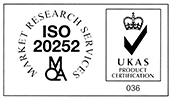
It was great news when the MRS announced in June that face-to-face data collection could now be undertaken when it was determined to be the most suitable methodology to use. And with lockdown restrictions eased this week, it seems a perfect time to speak to consumers to understand what really matters to them.
At Critical Research we had been poised for this news, having conducted a number of risk assessments, investing in appropriate PPE, introducing new measures to ensure the safety of our field force and the respondents, and running a pilot study last summer.
Let’s be honest, face-to-face is a timeless methodology, and despite the rise in the popularity of online and mobile surveys, face-to-face interviews are still one of the most popular quantitative research methods of collecting data.
The advantages of this methodology include:
- the ability to reach a nationally representative audience that mobile and online surveys research are not able to reach and CATI struggles to
- accurate screening of respondents, quotas such as age, gender, and SEG are validated at the start
- interviews are conducted in the moment, whether in-street, in-home, in-situ, or on the spot for an event, so the responses are in real-time
- interviewers are able to aid the respondent with anything that requires clarification and build a rapport
- free from technical distractions
- the ability to target a specific area to reach the right respondents
Over the last couple of months, we have conducted a variety of face to face research projects, here are some examples:
In-Situ Interviews:
Staff surveys both onboard trains and at specific stations. The research was used to help the operator understand if their staff were fully aware of impending changes.
Door Step Interviews:
Interviewing residents aged 50+ about local transport facilities. The survey was 20 minutes and was administered on the doorstep with social distancing in place.
Hall Tests:
Product Test in 8 different locations across the UK, including Scotland, Northern Ireland, and Wales. Women aged 16-65 took part in the 20-minute experience.
On-Site:
Interviewing visitors to specific outdoor sites across the country, to understand their levels of satisfaction with the facilities and the grounds.
Our approach to protecting our interviewers and respondents:
- Interviewers are given comprehensive training on COVID-19 safe interviewing practices and use of PPE
- Interviewer disclaimer read and signed before starting work
- Health screener completed online before each shift
- Clear instructions are provided for each project, detailing all safety procedures to follow
- PPE equipment is provided for each project, including face shields and hand sanitiser
- Health screener conducted with every respondent prior to the interview
- Dedicated team available to provide support and advice to interviewers and respondents
- Post project review to gain feedback and review our policies
Our face-to-face data collection team covers the entire UK, with 15 regional supervisors and a team of over 300 interviewers.

With interviewers spread across England, Scotland, Wales, and Northern Ireland, we undertake nationally representative studies, as well as the ability to target specific areas.
We use the latest ASKIA CAPI software. Scripting through one platform for CAPI, CATI, and CAWI, and mixed methodology studies.
Our face to face experience includes:
Central Location Tests (Hall Tests): TasteTests / Product / Concept Testing, Consumer Preference
At Home: Nationally Representative, Target Markets, Consumer Behaviour
Exit Interviews: Customer Satisfaction, Product or Service / Ad / Service Recall
Intercepts: In-Situ Interviewing Capturing In The Moment Opinions
Product Placement: Targeting Specific Audiences, Target Customers, Re-Visits
If you would like to discuss a face to face project with us please contact Sam Day



